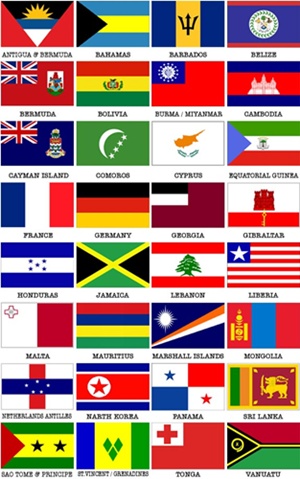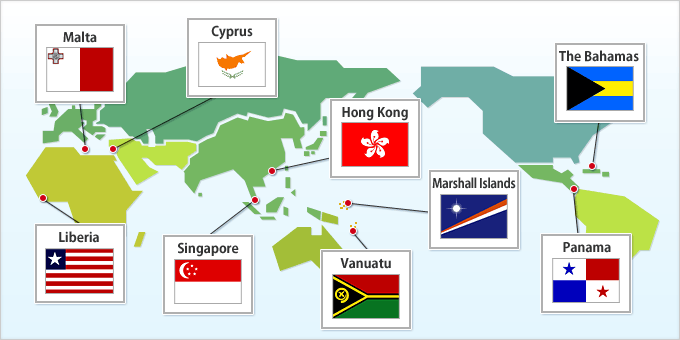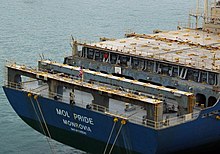Flag of convenience
Under flagging is to be understood in shipping the change of the national flag, with no change in the ownership of the vessel. Counter terms are ' flagging ' and ' flagging '.
- 3.1 Examples of flagging in aviation
- 3.2 Personnel Policy Definition of flagging
Shipping
Prerequisite for this measure, the change in the ship's registry of another State, mostly in a state with so-called " flags of convenience " (also called " flags of convenience ", " FOC " English " flag of convenience" ) is to save the target cost. Savings are mainly due to the wages which, for the most part, lower taxation in the flag of States that produce lower wage costs in the shipping companies, but also by often lower benefits for crew members (as defined by the respective wage bargaining ) which. Also, the safety and cast standards of some of the flags of states are easier and therefore cheaper to comply. The cast systems of most Erstregisterstaaten ( in Germany for example, the manning of Procedure), set a standard for the number and qualification of the crew members are relatively strict.
The ship's command is usually transmitted officers and engineers, which the owner (owner ) are known.
In Germany, guiding the national flag is regulated by the flag law. The location of the register determines the home port.
The International Transport Workers' Federation ( ITF) maintains a list of countries with flags of convenience. According to her, the majority of those involved in accidents in 2001 ships sailed under such flags of convenience, which will also represent a significant share of the world fleet. In addition, the ITF is committed to sailing under a flag of crews and attempts to negotiate collective agreements.
Even landlocked countries lead ship register. Branches of the shipping companies in countries with FOC are sometimes compared to a letter box entity.
Rückflaggungsaktion in Germany
Since 2000, the German shipping policy is largely determined by the National Maritime Conferences.
On the 3rd National Maritime Conference in Lübeck it came 2003 on the promise of the shipowner, by the end of 2005, at least 100 ships back under the German flag to bring. This promise satisfied the shipowner prematurely. In 2006, the owners pledged at the 5th National Maritime Conference in Hamburg, to bring to the end of 2008, another 100 ships under German flag to reach the number of 500 ships under German flag. The German fleet included at this time about 3,500 ships.
The 34 "flag - States ", according to ITF
Road
The flagging has already made school in the country road freight transport. German transport companies allow their vehicles abroad, such as in Cyprus.
Aviation
Similarly, the flagging place in a small degree in aviation. Here it is understood in the strict sense to mean that the led from the aircraft nationality mark does not match the nationality of the real operator.
Surfaces are eg
- The shifting of costs / profits in tax- favorable areas,
- Different licensing and maintenance procedures.
- Leased aircraft remain the property of the lessor and are thus registered at the headquarters of the lessor in the aircraft register.
Examples of flagging in aviation
- The corporate jet of Volkswagen AG is registered in the Cayman Islands through its subsidiary Volkswagen Air Service and thus carries the air vehicle registration VP- CVX.
- Many holders of smaller, not commercially used machines like this can register in the United States as the maintenance instructions are there less bureaucratic. Thus, the United States know the possibility that the holder - for exclusively used by him airplanes - can carry out the maintenance themselves instead of aeronautical operations.
- Many machines of Russian airlines that have not been built in Russia, are under leasing agreements or to circumvent import duties abroad, for example in France, Ireland, Germany or the Bahamas registered.
Personnel Policy Definition of flagging
Colloquially speaking but also in the trade union field of flagging when aircraft of an air transport operator owned by companies of external personnel or completely by a subcontractor in the colors that are operating on the routes, and partly under the call of the client. This is usually the primary motivation to take advantage of differences in collective agreements and cost structures, in some cases, also flagged out to compensate bereederungsbedingte bottlenecks in extreme growth situations.
Rail transport
Some German private railway companies, including the HGK, let their freight cars in Slovakia, Romania and Bulgaria. Reason probably simpler and cheaper admission formalities in these territories. Because of the RIV- ability, these cars are independent of their country of registration used throughout Europe.










